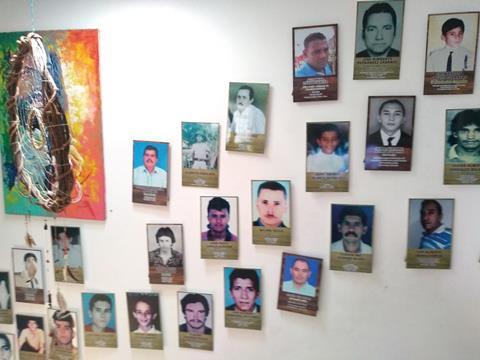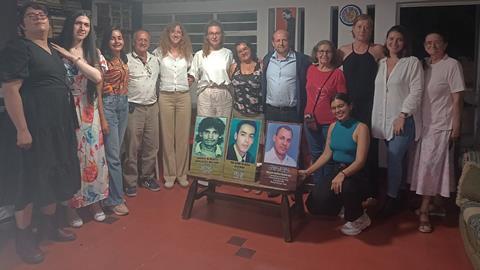In the second of two articles on lawyers supporting justice abroad, Eduardo Reyes reports on the work of the 15-year-old Colombia Caravana
‘The panorama of violence persists,’ Reinaldo Villalba says. The Colombian criminal defence lawyer is reflecting on the importance of the work done by a multinational group of lawyers that supports the country’s human rights defenders, lawyers – and by extension the rule of law – through annual visits and ongoing support from their own home countries.
It is 15 years since the Colombia Caravana’s first delegation arrived in Bogota, before fanning out to the country’s provinces. That first delegation set the model which is still used of observing trials, meeting with lawyers, human rights defenders and prisoners, and taking findings direct to local and national government officials, the judiciary and enforcement agencies.
In common with many Latin American countries, Colombia has a long-established tradition of lawyering and constitutionalism. But across that tradition falls the long shadow of the US ‘Monroe doctrine’, with its destabilising effect on the rule of law, and its successor problems – the autocracy, corruption and criminality that are wedded to, alternately, the ‘war on drugs’ and the violence that attends the drugs trade, which both drug gangs and guerilla forces profit from. That puts human rights defenders firmly in the line of fire – where they have remained, even as a peace process and settlement stabilised the country. By 2008, Colombia had endured six decades of conflict.
Professor Sara Chandler traces the Caravana’s roots to 2003, when Colombian human rights lawyer Liliana Uribe Tirado spoke at the Law Society at the opening of the legal year. As Uribe Tirado told the Gazette at the time: ‘The state began to apply anti-terrorist statutes against trades unionists, peasants and people living in marginal parts of the city.’
Uribe Tirado and other lawyers had formed a small collective which focused on defending such people. ‘Many of our lawyers who defend political prisoners are intimidated in the military installations where they go to visit prisoners,’ she added. ‘They have the finger pointed at them and are permanently exposed to set-ups by the police with witnesses who are paid to turn evidence and inform against those we represent.’
That same year, the president of the Law Society had written to the government of Colombia six times, expressing concern for the safety of lawyers and human rights defenders. Chandler also recalls the impression made on her when meeting another lawyer, Soraya Gutiérrez, who recalled being sent a doll covered in fake blood, with a message attached. The message read: ‘You have a beautiful daughter. Look after her.’
The first request to the Law Society, for direct help for peers in Colombia, came from the Inter-American Commission on Human Rights. This sought funding for two lawyers to review cases. In the event, one solicitor and one barrister were provided.
Then came the call from an umbrella group of Colombian human rights lawyers, in January 2008, for a delegation of 100 foreign lawyers to come ‘to Colombia to report on the killings, threats and harassment to which human rights advocates are subjected’.
In the event 72, including 45 from the UK, formed a delegation which arrived in August (Chandler pays tribute to the work of lawyer Courtenay Barklem, then employed by the Society and now chair of the Society’s Human Rights Committee).
On average, from 1991 to 2007, 250 lawyers and human rights advocates a year were murdered, the 2008 report noted. On 24 August, two days before the Caravana’s arrival, public defender’s office lawyer Jesus Escorcia Cortes, who had links to the trade union movement, was shot and killed.
In the 15 years of the Caravana, its lawyers have been able to secure access to courts, to prisoners, and to the authorities they sought meetings with. Their own personal safety has not been threatened. The Caravana attracts media interest, and they have been free to give interviews to the press, which they have done regularly.
But what they discovered in 2008 on spreading out from Bogota to the provinces was extremely serious. ‘We heard shocking and detailed eye-witness accounts from individuals, backed up by documentary evidence,’ the delegation’s 2008 report said. ‘The Caravana met with organisations monitoring the assassinations, attacks and harassment suffered by lawyers and other human rights advocates... The courage of the Colombian lawyers and the significance of their work left a lasting impact on the UK delegation.’
Sue Willman, now a senior consultant at Deighton Pierce Glynn, recalls the 2008 delegation as having a sense of excitement, chaos and urgency. ‘After briefings on the general situation, small groups travelled to regions round Colombia, which had never before seen an international lawyers delegation,’ she says. ‘In every region of Colombia and in the capital, we had access to senior local officials, from police chiefs, to prosecutors, local ombudsmen, prison staff and judges. We accompanied local lawyers and victims of the conflict to these meetings, which were a chance to put their case and to gain information.’
She remembers being accompanied around the city of Pereira by a trade unionist who had an armed escort for their protection. There was also the Colombian lawyer ‘who after a pizza and a few beers described his experience of being kidnapped at gunpoint’.
A further Caravana delegation was planned, for 2010, and a network established to support and raise concerns for those facing threats in between delegation visits, and provide ongoing monitoring. That work between visits is vital, Chandler notes, and has become easier to maintain as communication technology has improved. The Caravana was also established as a UK charity.
There were delegations to Colombia in 2012, 2013, 2014, 2016 and 2018. After the disruption of the Covid-19 pandemic, a delegation is planned for 2024.
The 2018 delegation arrived in the context of a ‘precarious’ peace agreement, signed in 2016, in which the left-wing FARC guerilla group participated. (Neighbouring countries were third parties to the agreement; it was preceded by a peace process that involved right-wing militias.) The risks had developed to include lawyers seeking to make perpetrators of past violence accountable.
Chandler takes a particular interest in the former president’s brother, Santiago Uribe Velez. He was on trial charged with assassinations, with alleged accomplices dubbed the ‘12 apostles’. (He denies the charges. At the time of writing, judgment is still pending). She participated in five observations of the trial over two years. And as pacification is prioritised over ‘justice’, human rights defenders (somos defensores) found they actually faced enhanced risks. Eighty somos defensores were killed in 2016; 106 in 2017.

So what is the effect of the Caravana’s work? There are moments of relief and satisfaction, Chandler adds. She points to the case of human rights defender David Ravelo Crespo, freed after seven years in prison when his case was taken up by members.
‘Ravelo Crespo was falsely accused and on trial when we were asked to assist,’ Chandler says. ‘Kirsty Brimelow, then chair of the Bar Human Rights Committee, and I, when I was chair of the Law Society Human Rights Committee, travelled to Bucaramanga, where we delivered an amicus curiae in chambers to the judge in the Superior Court of Santander, hearing David’s case. I spoke in a conference about his case at the University in Bucaramanga. We also visited David in La Picota prison in Bogota. The combined efforts of his lawyer and international pressure led to his release.’
Willman remembers her return to Colombia as delegation chair in 2016. She met ‘the Colombian woman lawyer Dora Lucy Arias Giraldo, a hero of mine, who had inspired the very first delegation. She and her family had faced unspeakable harassment and threats for her human rights work.’ She told Willman: ‘But for the Caravana, we would not be here.’
Delegations also highlight the impact business activity has on human rights. Willman worked with survivors of paramilitary violence allegedly linked to large multinationals to establish the Oil Justice group, which in 2012 filed a claim against BP on behalf of a kidnapped trade unionist Gilberto Torres. BP denied involvement in Torres’ kidnapping. A case in the High Court was discontinued due to funding problems, Willman’s firm said, with the court ordering no payment as to costs.
Villalba is clear about the impact of the Caravana’s work. ‘I have no doubt,’ he says, ‘that the support of the Caravana allows human rights defenders to receive support that allows them to remain in their communities and territories, as well as allowing them to continue practising law, despite the climate of risk.’
He says the presence and monitoring of the Caravana delegations ‘makes it possible to make visible serious situations of human rights violations in different regions of Colombia, which perhaps no one else makes visible, since the issue of judicial independence and violence against the practice of law is made invisible or receives little attention’. The Caravana ‘manages to show this hidden reality, especially in the regions’, he adds.
The focus on lawyers and human rights defenders has a wider effect, Villalba argues: ‘The Caravana deals comprehensively with the human rights situation.’ Its effectiveness in doing so arises because ‘its emphasis on the issue of guarantees for the practice of law gives it a special value, which translates into the need for the Caravana to keep its sights on Colombia’.
He concludes: ‘Violence and persecution against the practice of law continues. The main victims are lawyers defending human rights, servants of justice for fulfilling their mission, lawyers defending nature, and the territory, and environmentalists.’
To become involved in the work of the Colombia Caravana, email colombian.caravana@googlemail.com
The first article on Supporting Justice Abroad was published in last week’s Gazette magazine
































No comments yet